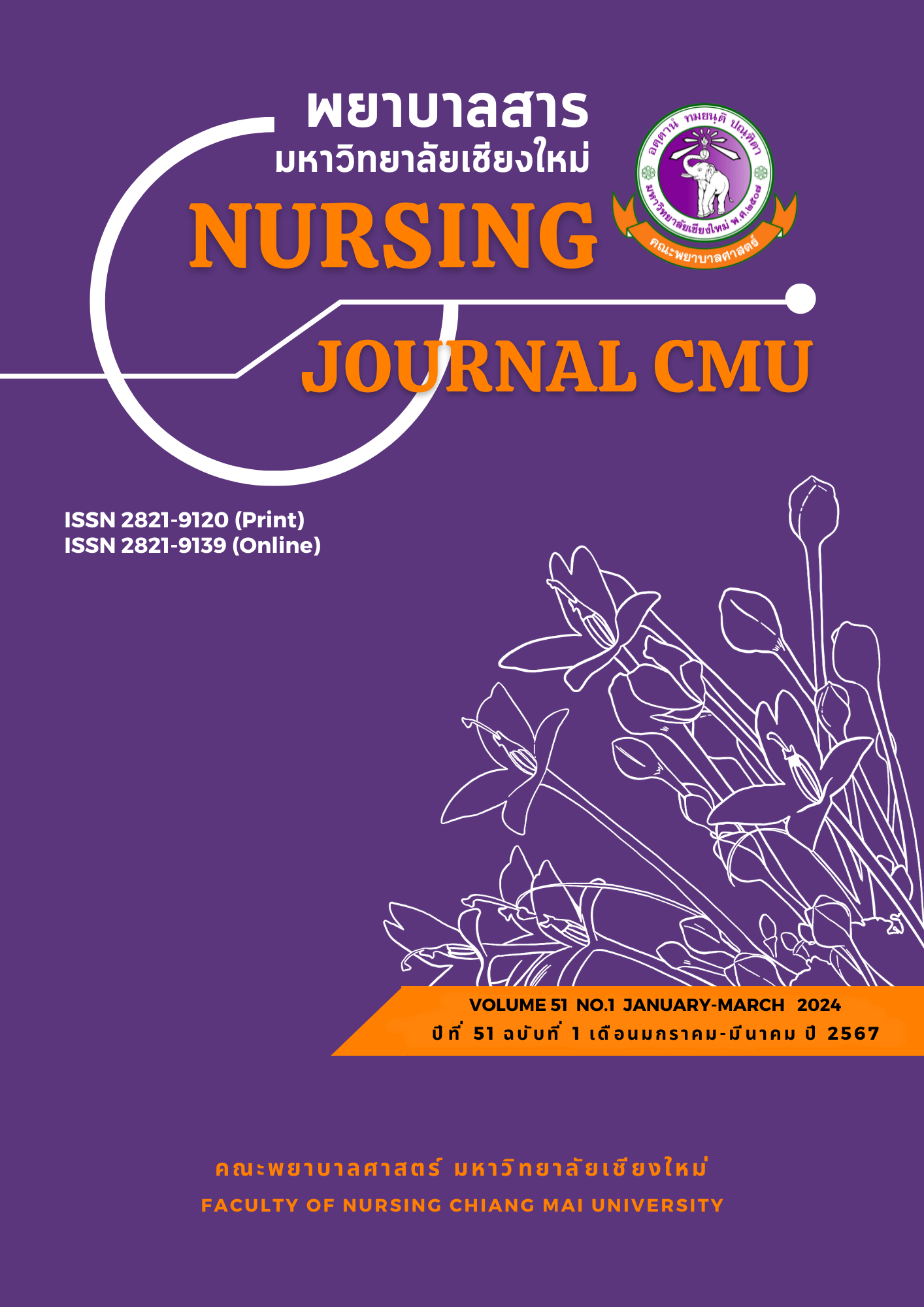The Effects of an Educational Program for Heart Failure Prevention Using Telephone Monitoring on Symptoms and Quality of Life Among Patients with Valvular Heart Disease
Keywords:
Educational program, Telephone monitoring, Symptom severity, Quality of life, Valvular heart disease, Heart failure preventionAbstract
Patients with valvular heart disease will experience fewer symptoms of heart failure and have a higher quality of life if they learn about heart failure prevention. This experimental research design aimed to examine the effects of an educational program for heart failure prevention using telephone monitoring on symptoms and quality of life (QOL) among patients with valvular heart disease. The sample consisted of 44 patients who followed up for treatment at Mahasarakham Hospital. Table random sampling was used to assign the patients to an experimental or a control group. The research instruments included the Educational Program, the Symptom Severity Scale, and the SF-36 for measuring QOL. The reliabilities of the questionnaires were 1.00 and .88, respectively. Data were analyzed using descriptive statistics, Mann-Whitney-U test, Wilcoxon signed-rank test, t-test and paired t-test.
The results showed that after the intervention, the experimental group had statistically significantly lower perceived symptom severity scores for dyspnea on exertion and nausea than the control group (p < .05). The experimental group had statistically significantly lower symptom severity scores for dyspnea on exertion, orthopnea, foot and ankle swelling, dry cough, fatigue, nausea, dizziness, palpitation, and chest pain than before the intervention (p < .05). There was no difference in QOL scores between groups. However, the experimental group demonstrated a significantly greater change in QOL scores, compared to the control group. The experimental group also had statistically significantly higher QOL scores than before the intervention (p < .05).
The study indicates that this educational program can reduce the severity of crucial HF symptoms and improve the QOL of patients with valvular heart disease. Therefore, nurses should apply it to prevent HF in these patients.
References
Chintamani., Gopichandran, L., & Mrinalini, M. (2021). Lewis's medical-surgical nursing: Assessment and management of clinical problems (4th ed.). Elsevier.
Dodd, M. J., Janson, S., Facione, N., Faucett, J., Froelicher, E. S., Humphreys, J., Lee, K., Miaskowski, C., Puntillo, K., Rankinm, S., & Taylor, D. (2001). Advancing the science of symptom management. Journal of Advanced Nursing, 33(5), 668–676.
Honchai, T., Intralawan, P., Sanit, K., Jomkan, W., & Promwichai, P. (2020). Compare the results of reducing the severity of symptoms, quality of life and readmission among congestive heart failure patients who received the program of congestive heart failure, compared to patients who were normally recommended. Chiangrai Medical Journal, 12(1), 20-30. (in Thai)
Huang, T. Y., Tsai, M. F., & Moser, D. K. (2023). Symptom cluster patterns predict mortalityin patients with heart failure. Journal of Cardiac Failure, 29(4), 643. https://doi.org/10.1016/j.cardfail.2022.10.236
Meehanpong, P., & Chatdokmaiprai, K. (2019). Assessing quality of research instrument in nursing. Research Journal of the Royal Thai Army Nurses, 19(1), 9-15. (in Thai)
Methakanjanasak, N. (2005). Self-management of end stage renal disease patients receiving hemodialysis [Unpublished master’s thesis]. Chiang Mai University.
Naopradist, R., Duangpaeng, S., & Kunsongkeit, W. (2019). Factors influencing health-related quality of life among congestive heart failure patients. Journal of Phrapokklao Nursing College, 30(1), 27-39. (in Thai)
Niyomthai, N., Siripitayakunkit, A., & Duangbubpha, S. (2020). Effects of a motivation for self-care program on self-care and quality of life in persons with heart failure. Ramathibodi Nursing Journal, 26(3), 290-309. (in Thai)
Polit, D. F., & Beck, C. T. (2022). Essentials of nursing research: Appraising evidence for nursing practice (10th ed.). Wolter Kluer.
Promwong, W., Meenongwah, J., Ginggeaw, S., & Charoensri, R. (2022). Knowledge and self-care behavior among patients with heart failure in the 50th anniversary Mahavajiralongkorn Hospital Ubon Ratchathani Province. Journal of Health and Nursing, 38(1), 172-185. (in Thai)
Ritklar, L. (2014). Effectiveness of a self-management program on dyspnea, re-admission, and quality of life in congestive heart failure patients. Thammasat University Medical School, 14(2), 181-190. (in Thai)
Savarese, G., Becher, P. M., Lund, L. H., Seferovic, P., Rosano, G. M. C., & Coats A. J. S. (2022). Global burden of heart failure: A comprehensive and updated review of epidemiology. Cardiovascular Research, 118, 3272–3287. https://doi.org/10.1093/cvr/cvac013
Tepsuriyanont, S. (2017). Quality of life in heart failure patients. Journal of The Royal Thai Army Nurses, 18(1), 39-45. (in Thai)
Terdsudthironapoom, P. (2015). The effects of self-care promoting program on self-care behaviors and quality of life among patients with heart failure in Prachuapkhirikhan Hospital. Thai Journal of Cardio-Thoracic Nursing, 26(1), 2-13. (in Thai)
Ware, J. E. (2000). SF-36 health survey update. Spine, 25(24), 3130–3139.
Ware, J. E. (2003). Conceptualization and measurement of health-related quality of life: Comments on an evolving field. Archives of Physical Medicine and Rehabilitation, 84(Suppl. 2), S43-S49.
Wongpiriyayothar, A., Pothiban, L., Liehr, P., Senaratana, W., & Sucumvang, K. (2008).Effects of home-based care program on symptom alleviation and well-being among persons with chronic heart failure. Thai Journal of Nursing Research, 12(1), 25-39.
Wongpiriyayothar, A., Sittipakorn, S., & Sutthicharoen, U. (2018). The relationships between perception of symptom severity and quality of life in patients with valvular heart disease. Research and Development Health System Journal, 11(2), 327-344. (in Thai)
World Health Organization. (2021). Cardiovascular diseases (CVDs). https://www.who.int/news-room/fact-sheets/detail/cardiovascular-diseases-(cvds)
Wu, J. R., Lin, C. Y., Hammash, M., & Moser, D. K. (2023). Heart failure knowledge, symptom perception, and symptom management in patients with heart failure. The Journal of Cardiovascular Nursing, 38(4), 312-318. https://doi.org/10.1097/JCN.0000000000000961
Downloads
Published
How to Cite
Issue
Section
License
Copyright (c) 2024 Nursing Journal CMU

This work is licensed under a Creative Commons Attribution-NonCommercial-NoDerivatives 4.0 International License.
บทความที่ได้รับการตีพิมพ์เป็นลิขสิทธิ์ของวารสารพยาบาลสาร
ข้อความที่ปรากฏในบทความแต่ละเรื่องในวารสารวิชาการเล่มนี้เป็นความคิดเห็นส่วนตัวของผู้เขียนแต่ละท่านไม่เกี่ยวข้องกับมหาวิทยาลัยเชียงใหม่ และคณาจารย์ท่านอื่นๆในมหาวิทยาลัยฯ แต่อย่างใด ความรับผิดชอบองค์ประกอบทั้งหมดของบทความแต่ละเรื่องเป็นของผู้เขียนแต่ละท่าน หากมีความผิดพลาดใด ๆ ผู้เขียนแต่ละท่านจะรับผิดชอบบทความของตนเองแต่ผู้เดียว






